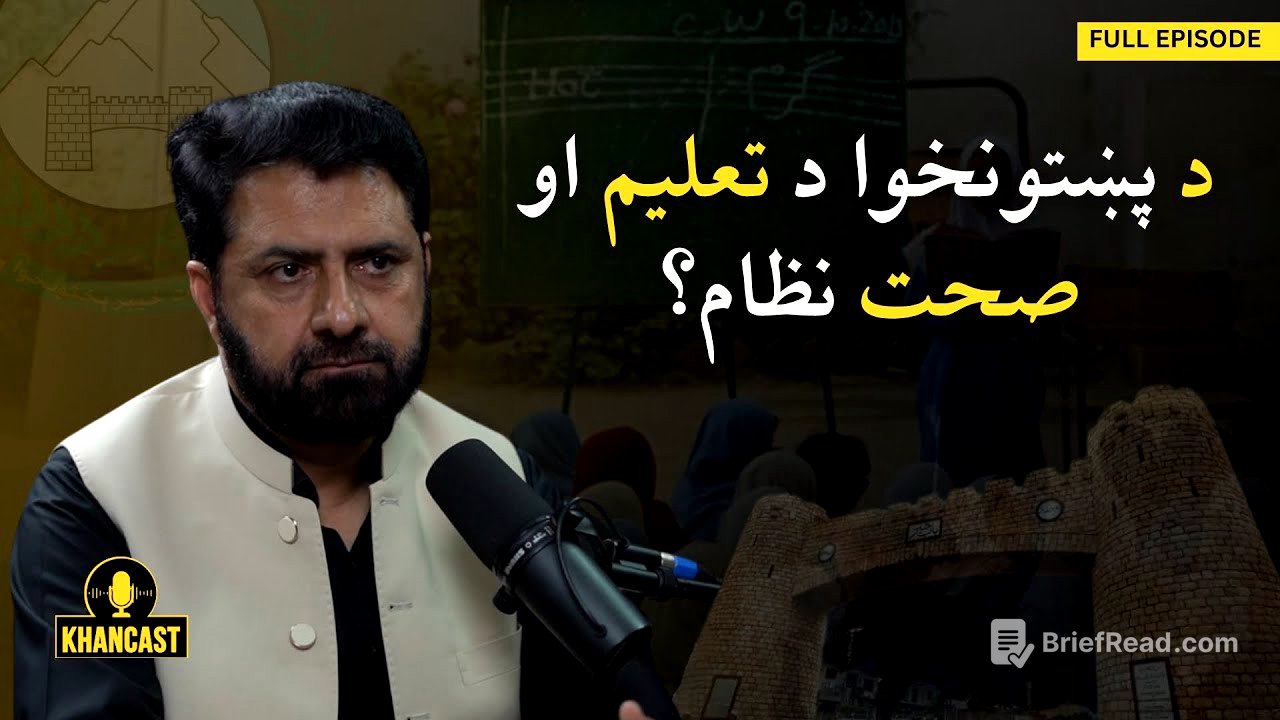TLDR;
This video features a discussion on critical issues in Pakistan, focusing on the health and education systems, financial resource allocation, and provincial rights. It highlights challenges such as inadequate healthcare infrastructure, high dropout rates in schools, and financial mismanagement in development projects. The conversation also covers potential solutions like social health insurance, corporate governance in hospitals, and equitable resource distribution among provinces.
- Discusses challenges in Pakistan's health and education sectors.
- Examines financial resource allocation and project management.
- Addresses provincial rights and equitable resource distribution.
Introduction [0:09]
The discussion begins by outlining several critical areas of concern in Pakistan, including technology, the education system, healthcare, and financial resource allocation. Specific issues mentioned include the condition of schools, high dropout rates, hospital treatment challenges, and the need for improved healthcare and private security systems.
Guests Introduction [1:22]
The host, Khancast, welcomes Khurshid Kasuri, a senior leader from Jamaat-e-Islami, to the studio. The discussion aims to explore the ideology of Jamaat-e-Islami, particularly concerning the challenges in health, population welfare, and development in Pakistan.
Challenges in Pakistan's Health System [2:19]
The conversation highlights the significant challenges within Pakistan's health system, noting that it is primarily tax-funded. The discussion explores alternative models, such as social health insurance systems used in the UK and Germany, where resources are pooled, and payments are made based on treatment needs. The American system, including Medicare and Medicaid, is also mentioned.
Financing and Regulation of Healthcare [4:51]
The discussion emphasizes the need for Pakistan to improve its healthcare financing and regulation mechanisms. Currently, the state acts as the primary healthcare provider, regulator, and financier. The conversation suggests exploring models like the German social health insurance system, with technical assistance from agencies like GIZ.
Social Health Insurance and Government Initiatives [5:47]
The conversation touches on social protection initiatives like Bait-ul-Mal and Zakat, as well as insurance for government employees. The discussion highlights the role of social health insurance cards in accessing treatment at various levels, including private and government hospitals. The importance of a functional referral system is also emphasized.
Focus on Prevention and Primary Healthcare [7:44]
The discussion shifts to the importance of prevention and creating a healthy society. It emphasizes strengthening primary healthcare systems, promoting awareness of disease prevention, and fostering healthy habits. The conversation also touches on the need for a healthy environment and society, with a focus on preventive measures for the poor.
Government Projects and Hospital Categorization [8:53]
The conversation discusses government projects and programs aimed at improving healthcare. It mentions the categorization of hospitals (A, B, C, D) based on their facilities and bed capacity. The discussion also highlights the importance of teaching hospitals and district headquarters hospitals in providing comprehensive care.
Dysfunctional Units and Preventative Programs [10:39]
The discussion points out the dysfunctionality of lower-level healthcare units and the need to strengthen preventative and promotive programs. It mentions various national programs, such as TB control, EPI, and family planning, and emphasizes the importance of human resources, particularly nurses, at the district level.
Referral Systems and World Bank Support [11:31]
The conversation highlights the introduction of referral systems and the role of district headquarters hospitals. It mentions potential support from the World Bank for health and education projects, emphasizing the need for sustained reforms and a focus on people-centric healthcare.
Healthcare Reforms and Corporate Governance [13:37]
The discussion explores healthcare reforms, including the involvement of senior bureaucrats and the introduction of initiatives like Sehat Card. It touches on the potential shift towards private sector dependence and the importance of corporate governance in hospitals. The conversation emphasizes the need for autonomous boards and financial efficiency.
Corporate Governance and Hospital Management [15:34]
The discussion continues on corporate governance, emphasizing the need for non-politicized expert boards to manage hospitals. It suggests outsourcing services and ensuring financial independence through one-line budgets. The conversation also highlights the importance of public health experts and experienced professionals in hospital management.
Universal Health Coverage and Critical Analysis [18:11]
The conversation touches on universal health coverage and the need for critical analysis of existing healthcare systems. It mentions the importance of complete financing models, whether through social insurance or welfare states, and suggests that Pakistan needs to balance government funding with infrastructure and policy development.
Private Sector Involvement and Treatment Limitations [20:12]
The discussion explores the role of the private sector in healthcare, including the introduction of Sehat Cards and cash schemes. It notes that while private hospitals offer treatment, there are limitations and waiting periods. The conversation also mentions government reviews of rates for treatments in private hospitals.
Systemic Treatment and Sustainable Systems [22:04]
The conversation emphasizes the need for systemic and sustainable treatment approaches in both the healthcare and education systems. It highlights the challenges in schools, such as overcrowded classrooms, lack of basic facilities, and violence. The discussion also touches on the impact of technology and the need for improved education policies.
Challenges in the Education System [23:32]
The discussion outlines the challenges in the education system, including the large number of out-of-school children and the poor condition of school infrastructure. It mentions missing facilities like boundary walls, washrooms, and adequate classrooms. The conversation also highlights issues with drinking water quality and access, particularly in rural areas.
Dropout Rates and Curriculum Development [25:47]
The conversation addresses the high dropout rates in schools, particularly at the high school and higher secondary levels. It emphasizes the need for curriculum unification and coordination mechanisms to develop independent and relevant textbooks. The discussion also touches on the importance of aligning curriculum policies with educational goals.
Budget Allocation and Financial Projections [28:28]
The discussion shifts to budget allocation and financial projections for development projects. It mentions figures related to revenue, expenditure, and surplus budgets, highlighting the importance of accurate financial planning and project management. The conversation also touches on the role of international financial institutions like the IMF.
Development Projects and Financial Mismanagement [31:16]
The conversation explores various development projects and instances of financial mismanagement. It mentions projects being dropped or delayed, universities facing financial crises, and issues with recruitment and political interference. The discussion emphasizes the need for transparency and accountability in project implementation.
University Finances and Political Influence [35:43]
The discussion continues on university finances, highlighting issues such as financial mismanagement, political influence in recruitment, and the exclusion of certain academic disciplines. It emphasizes the need for fair appointment criteria for vice-chancellors and limited bureaucratic interference in university operations.
Financial Issues and Arbitration [40:13]
The conversation addresses financial issues and arbitration cases, mentioning figures related to claims and settlements. It discusses the involvement of various committees and tribunals in resolving financial disputes, emphasizing the need for transparency and adherence to legal processes.
Power Generation and Distribution [47:34]
The discussion shifts to power generation and distribution, highlighting issues such as surplus capacity, payment problems, and the influence of mafia groups and politicians. It mentions the involvement of international companies and the need for fair and transparent agreements in the energy sector.
Electricity Capacity and Payment Issues [49:30]
The conversation continues on electricity, noting that Pakistan has a surplus in power generation capacity but faces challenges in distribution and payment. It mentions the involvement of various stakeholders, including international companies and political figures, and the need for transparency and accountability in the energy sector.
Profitability and Future Technologies [52:36]
The discussion touches on the profitability of power generation and the potential of future technologies like solar power. It emphasizes the need for advancements in solar technology and net metering to promote sustainable energy solutions.
Resource Allocation and Provincial Rights [56:33]
The conversation shifts to resource allocation and provincial rights, highlighting the importance of equitable distribution based on population and other factors. It mentions the National Finance Commission (NFC) and the need for fair awards that address the concerns of all provinces.
NFC Awards and Provincial Concerns [58:23]
The discussion continues on NFC awards, noting that Punjab has faced losses due to population-based distribution. It emphasizes the need for fresh NFC awards that address the concerns of all provinces and ensure equitable resource allocation.
Provincial Rights and Political Issues [59:32]
The conversation touches on provincial rights and political issues, highlighting the importance of addressing these concerns through dialogue and consensus. It mentions the role of political parties like Jamaat-e-Islami in advocating for provincial rights and holding the government accountable.
Media and Public Pressure [1:00:42]
The discussion emphasizes the role of media and public pressure in holding the government accountable and advocating for provincial rights. It mentions the importance of public awareness and the need for political parties to effectively communicate their message to the public.
Conclusion [1:02:02]
The discussion concludes with a call for real dialogue and efforts to address the various issues discussed, including health, education, financial management, and provincial rights. It emphasizes the need for sustained efforts and a commitment to improving the lives of the people of Pakistan.









